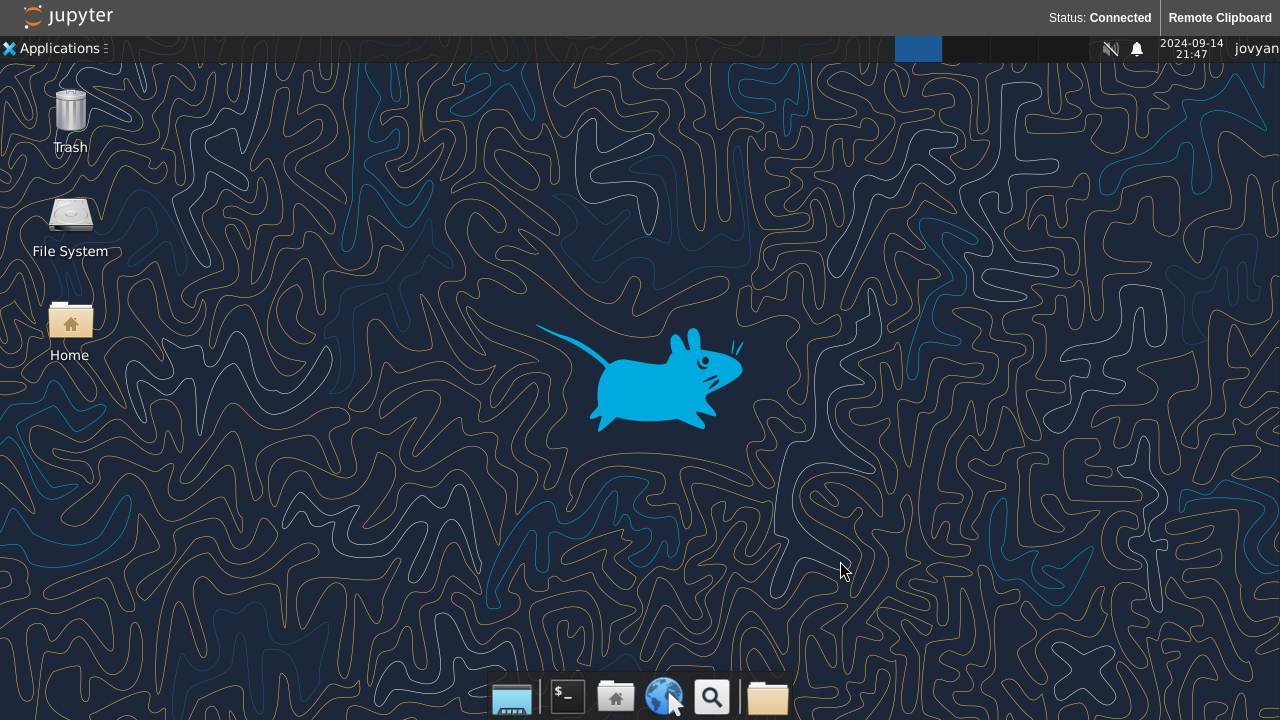Run a desktop environments on Jupyter
Project description
Jupyter Remote Desktop Proxy
Run XFCE (or other desktop environments) on Jupyter.
This is based on https://github.com/ryanlovett/nbnovnc.
When this extension is launched it will run a Linux desktop on the Jupyter single-user server, and proxy it to your browser using VNC via Jupyter.
VNC Server
This extension requires installing a VNC server on the system (likely in a
container image). Compatibility with the latest version of TigerVNC and
TurboVNC is maintained and verified with tests, but other VNC servers
available in $PATH as vncserver could also work. The vncserver binary
needs to accept the flags seen passed here, such as -rfbunixpath and a few
others.
For an example, see the Dockerfile in this repository which
installs either TigerVNC or TurboVNC together with XFCE4.
Installation
-
Install this package itself, with
pipfromPyPI:pip install jupyter-remote-desktop-proxy
-
Install the packages needed to provide a VNC server and the actual Linux Desktop environment. You need to pick a desktop environment (there are many!) - here are the packages to use TigerVNC and the light-weight XFCE4 desktop environment on Ubuntu 24.04:
dbus-x11 xfce4 xfce4-panel xfce4-session xfce4-settings xorg xubuntu-icon-theme tigervnc-standalone-serverThe recommended way to install these is from your Linux system package manager of choice (such as apt).
Docker
To spin up such a notebook first build the container:
$ docker build -t $(whoami)/$(basename ${PWD}) .
Now you can run the image:
$ docker run --rm --security-opt seccomp=unconfined -p 8888:8888 $(whoami)/$(basename ${PWD})
Executing the command: jupyter notebook
[I 12:43:59.148 NotebookApp] Writing notebook server cookie secret to /home/jovyan/.local/share/jupyter/runtime/notebook_cookie_secret
[I 12:44:00.221 NotebookApp] JupyterLab extension loaded from /opt/conda/lib/python3.7/site-packages/jupyterlab
[I 12:44:00.221 NotebookApp] JupyterLab application directory is /opt/conda/share/jupyter/lab
[I 12:44:00.224 NotebookApp] Serving notebooks from local directory: /home/jovyan
[I 12:44:00.225 NotebookApp] The Jupyter Notebook is running at:
[I 12:44:00.225 NotebookApp] http://924904e0a646:8888/?token=40475e553b7671b9e93533b97afe584fa2030448505a7d83
[I 12:44:00.225 NotebookApp] or http://127.0.0.1:8888/?token=40475e553b7671b9e93533b97afe584fa2030448505a7d83
[I 12:44:00.225 NotebookApp] Use Control-C to stop this server and shut down all kernels (twice to skip confirmation).
[C 12:44:00.229 NotebookApp]
To access the notebook, open this file in a browser:
file:///home/jovyan/.local/share/jupyter/runtime/nbserver-8-open.html
Or copy and paste one of these URLs:
http://924904e0a646:8888/?token=40475e553b7671b9e93533b97afe584fa2030448505a7d83
or http://127.0.0.1:8888/?token=40475e553b7671b9e93533b97afe584fa2030448505a7d83
*snip*
Now head to the URL shown and you will be greated with a XFCE desktop.
Note the --security-opt seccomp=unconfined parameter - this is necessary
to start daemons (such as dbus, pulseaudio, etc) necessary for linux desktop
to work. This is the option kubernetes runs with by default, so most kubernetes
based JupyterHubs will not need any modifications for this to work.
Configuration
The VNC server will default to launching ~/.vnc/xstartup.
If this file does not exist jupyter-remote-desktop-proxy will use a bundled xstartup file that launches dbus-launch xfce4-session.
You can specify a custom script by setting the environment variable JUPYTER_REMOTE_DESKTOP_PROXY_XSTARTUP.
Limitations
- Desktop applications that require access to OpenGL are currently unsupported.
Project details
Release history Release notifications | RSS feed
Download files
Download the file for your platform. If you're not sure which to choose, learn more about installing packages.
Source Distribution
Built Distribution
Filter files by name, interpreter, ABI, and platform.
If you're not sure about the file name format, learn more about wheel file names.
Copy a direct link to the current filters
File details
Details for the file jupyter_remote_desktop_proxy-3.0.1.tar.gz.
File metadata
- Download URL: jupyter_remote_desktop_proxy-3.0.1.tar.gz
- Upload date:
- Size: 402.5 kB
- Tags: Source
- Uploaded using Trusted Publishing? Yes
- Uploaded via: twine/6.1.0 CPython/3.12.9
File hashes
| Algorithm | Hash digest | |
|---|---|---|
| SHA256 |
92c428621464c9f7b51694c8b18aa60ba7e39266cb4af8f420d13b498f1b1cd9
|
|
| MD5 |
9b15a3366b9a2793cb8b219fcc780124
|
|
| BLAKE2b-256 |
4efce7eba005a781526de713dbc362dcfa88134276cf5214de4001d686640ed2
|
Provenance
The following attestation bundles were made for jupyter_remote_desktop_proxy-3.0.1.tar.gz:
Publisher:
release.yaml on jupyterhub/jupyter-remote-desktop-proxy
-
Statement:
-
Statement type:
https://in-toto.io/Statement/v1 -
Predicate type:
https://docs.pypi.org/attestations/publish/v1 -
Subject name:
jupyter_remote_desktop_proxy-3.0.1.tar.gz -
Subject digest:
92c428621464c9f7b51694c8b18aa60ba7e39266cb4af8f420d13b498f1b1cd9 - Sigstore transparency entry: 195544828
- Sigstore integration time:
-
Permalink:
jupyterhub/jupyter-remote-desktop-proxy@2321447f37f2cadf9f87f089fb46a92a7cf82e2b -
Branch / Tag:
refs/tags/v3.0.1 - Owner: https://github.com/jupyterhub
-
Access:
public
-
Token Issuer:
https://token.actions.githubusercontent.com -
Runner Environment:
github-hosted -
Publication workflow:
release.yaml@2321447f37f2cadf9f87f089fb46a92a7cf82e2b -
Trigger Event:
push
-
Statement type:
File details
Details for the file jupyter_remote_desktop_proxy-3.0.1-py3-none-any.whl.
File metadata
- Download URL: jupyter_remote_desktop_proxy-3.0.1-py3-none-any.whl
- Upload date:
- Size: 404.3 kB
- Tags: Python 3
- Uploaded using Trusted Publishing? Yes
- Uploaded via: twine/6.1.0 CPython/3.12.9
File hashes
| Algorithm | Hash digest | |
|---|---|---|
| SHA256 |
da305e5980c87235330a6576e4fb8469753a8196fbda39acd6e7aa521c6a7942
|
|
| MD5 |
8ba9c1b29abd353d5c31ad51e4f60ef3
|
|
| BLAKE2b-256 |
3c821406638818021e2a28d2b247dc4bda807d8cb483aa60557056307904c013
|
Provenance
The following attestation bundles were made for jupyter_remote_desktop_proxy-3.0.1-py3-none-any.whl:
Publisher:
release.yaml on jupyterhub/jupyter-remote-desktop-proxy
-
Statement:
-
Statement type:
https://in-toto.io/Statement/v1 -
Predicate type:
https://docs.pypi.org/attestations/publish/v1 -
Subject name:
jupyter_remote_desktop_proxy-3.0.1-py3-none-any.whl -
Subject digest:
da305e5980c87235330a6576e4fb8469753a8196fbda39acd6e7aa521c6a7942 - Sigstore transparency entry: 195544832
- Sigstore integration time:
-
Permalink:
jupyterhub/jupyter-remote-desktop-proxy@2321447f37f2cadf9f87f089fb46a92a7cf82e2b -
Branch / Tag:
refs/tags/v3.0.1 - Owner: https://github.com/jupyterhub
-
Access:
public
-
Token Issuer:
https://token.actions.githubusercontent.com -
Runner Environment:
github-hosted -
Publication workflow:
release.yaml@2321447f37f2cadf9f87f089fb46a92a7cf82e2b -
Trigger Event:
push
-
Statement type:





















